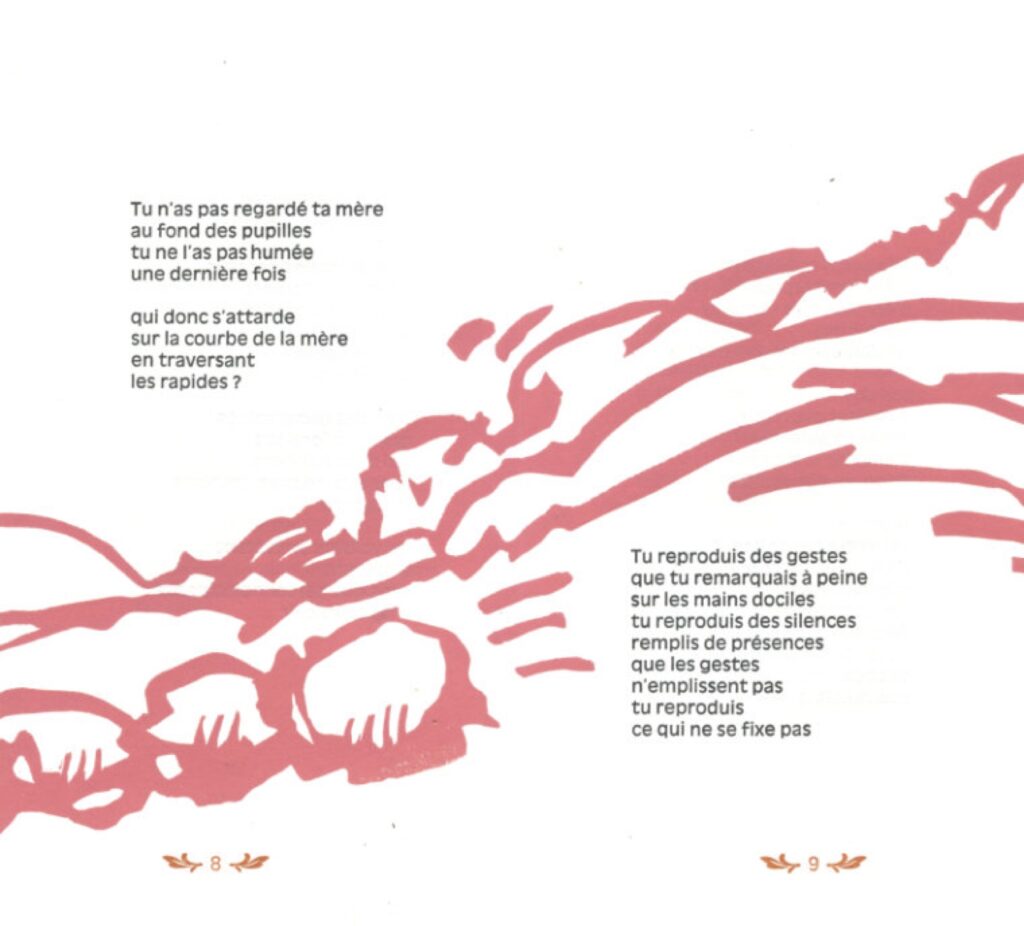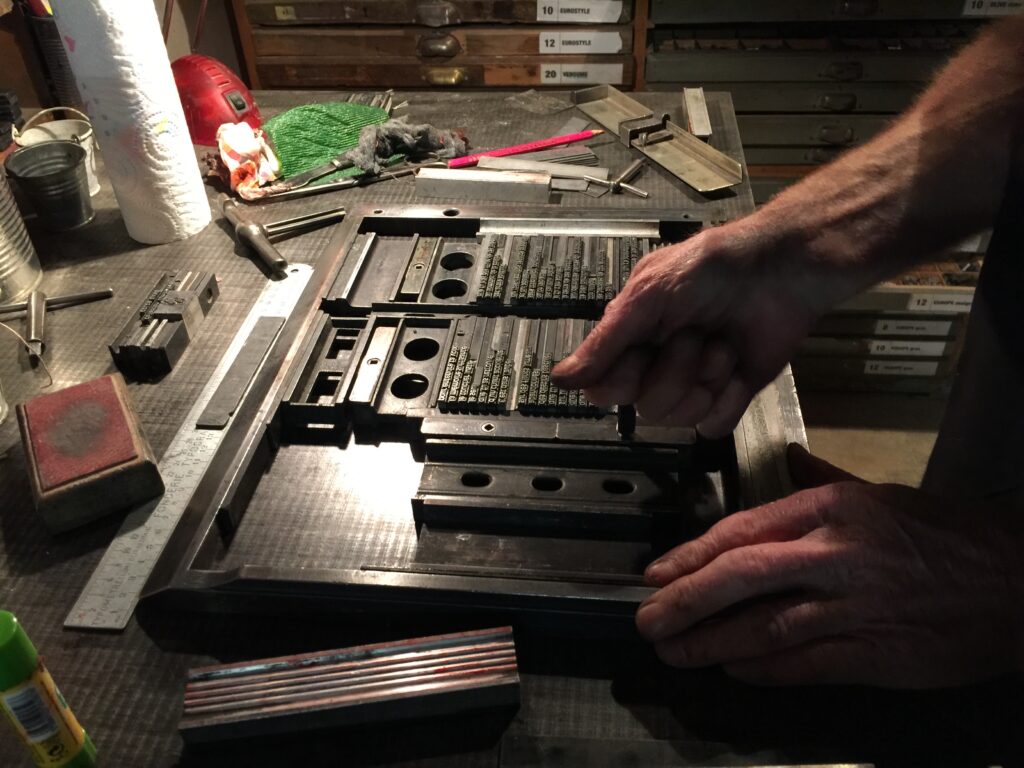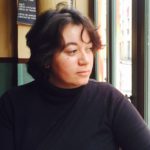“Alba Rosa” by Samira Negrouche, Translated by Marilyn Hacker
Alba Rosa, originally published as a letterpress chapbook by Color Gang in 2019, includes artwork by Yves Olry. You can purchase a copy of the chapbook here. Yves Olry, who recently passed away, was also the cover artist for Marilyn Hacker’s translation of The Olive Trees’ Jazz and Other Poems by Samira Negrouche (purchase here from Pleiades Press). We would like to honor the life of Yves Olry by sharing “Alba Rosa,” and some images of the chapbook’s artwork and letterpress process, as well as a video of Samira Negrouche reading the poem.
| Tu n’as pas abandonné la maison c’est la maison qui t’a abandonné ton pays les bâtisses de ton enfance ton village ce bleu particulier aux dernières heures du printemps la terre de tes ancêtres si tu t’en souviens les cailloux placés là qu’on replace sans trop savoir pourquoi et qui apaisent qui rassurent nos regards pressés cet arbre solitaire au sommet de la colline que tu n’as pas foulé de tes pieds * Tu n’as pas marché sur la colline de ton enfance cette ombre minérale aux courbes volatiles au sommet nébuleux est le centre de ton centre l’axe qui trace la voie de midi midi baigné de soleil dont l’aiguille trace le Nord c’est sur les sentiers arides où tu es seul à perdre la trace où tu retardes la rencontre où tu contournes l’espace que tu attends * Tu n’as pas murmuré de verbes inavouables à l’oreille frémissante cette chanson accidentelle que seul le désir éveille est restée plantée dans ta gorge il arrive que dans la moiteur d’un horizon semblable tes pulpes deviennent pourpres de la chanson qui s’éveille * Tu n’as pas rangé les photos de famille sur un dossier numérique en prévision d’un déménagement les photos fanent comme fanent les roses mais ne reviennent pas à la saison suivante tu penses à ces visages dilués dans ta mémoire à ces rues qui portent un autre nom à ces glycines d’un temps perdu qui tapissent tes narines à celle que tu planteras peut-être pour rassembler tes yeux * Tu n’as pas repeint les volets de la cuisine que de matins perchés à regarder l’ombre lointaine ! La colline si proche si familière si confidente si confiante il y a des géographies qui nous fondent qui nous habitent sans que nous en prenions la mesure les volets s’émiettent à présent sans que personne ne pense à les rafraichir * Tu n’as pas regardé ta mère au fond des pupilles tu ne l’as pas humée une dernière fois qui donc s’attarde sur la courbe de la mère en traversant les rapides ? * Tu reproduis des gestes que tu remarquais à peine sur les mains dociles tu reproduis des silences remplis de présences que les gestes n’emplissent pas tu reproduis ce qui ne se fixe pas * Ton corps n’a pas fini d’habiter l’espace d’éprouver les sentiers aux heures les plus sombres ton chant n’a pas fini d’habiter ces creux gorgés d’attente d’envahir le thorax de ce souffle familier la parole est entre tes doigts c’est dans ton corps que tout parle dans ton coude ta poitrine dans ton sein plissé dans ton ventre mou c’est dans ta chair que renait la voix * Tu as habité le sol sous tes orteils nul ne prévoit quand commence le voyage quand il est temps de quitter la colline de cheminer vers la montagne des autres nul ne prévoit où se dessinent les lignes qui te séparent de la géographie des autres de leurs ombres tu as habité de tout ton être la ligne à traverser * Sous tes doigts les pierres reprennent vie toi seul reconnais les cercles blancs que tracent les pèlerins du déplacement toi seul sais la foi unique la langue muette que seuls les déplacés entendent sous tes doigts les pierres parlent elles disent les saisons qui verdissent et accablent avec les vents contraires * Quand on cherche c’est avec les mains qu’on observe avec le corps ouvert abandonné à la montagne c’est dans le mouvement que s’enracine la mémoire dans le mouvement que s’habite la courbe ta maison abandonne qui l’abandonne s’émiette sur qui veut rouiller son souffle ta maison c’est là où tu transportes ton enfance * C’est dans l’aube d’une rive sauvage que tu as planté quelques lettres sur une ligne enfouie que tu as vu des destins basculer abandonnés sur des flancs jumeaux C’est dans l’aube d’un chant accidentel que tu as figé ton doute que tu as retrouvé le seuil le toucher juste la mémoire suffisante pour entendre ta voix. | You didn’t leave home your home left you your country the buildings of your childhood your village that special blue of the last hours of spring land of your ancestors if you remembered those pebbles placed just so and put back without quite knowing why that assuage that reassure our hurried glances that solitary tree on a hilltop where you never set foot * You didn’t walk on the hill of your childhood that mineral shadow its ephemeral curves its nebulous summit is your center’s center axis marking the passage of noon sun-soaked noon whose needle points North it’s on these arid paths where you lose your way alone where you delay the encounter where you circumvent space that you wait * You didn’t murmur unmentionable words to a trembling ear that accidental song only desire awakened stayed rooted in your throat sometimes in the damp of a similar horizon your pulp turns purple with the awakening song * You didn’t arrange the family photos in a digital folder to prepare for moving the photos fade as roses wilt but won’t be back next season you think of those faces diluted in your memory of those streets that now have different names of that long ago wisteria carpeting your nostrils of the one perhaps you’ll plant to summon back your eyes * You didn’t repaint the kitchen shutters how many mornings perched there to stare at the distant shadow ! The hill so close so familiar so confiding so confident there are geographies that create us that inhabit us without our ever knowing quite how much the blue on the shutters flakes off now but no one thinks of repainting them * You didn’t look at your mother from the depths of your eyes you didn’t breathe her scent in one last time but who pauses at the mother-curve crossing the rapids? * You copy gestures that you barely noticed on docile hands you imitate silences once full of presence that your gestures don’t refill you repeat what can’t be fixed in place * Your body continues to inhabit space testing its paths during the darkest hours your song continues to live in those hollows swollen with waiting to sweep through the thorax with that familiar breath the word is between your fingers in your body everything is speaking in your elbow your chest your wrinkled breast your slack belly it’s in your flesh that the voice is reborn * You inhabited the ground under your toes no one foresees when the journey will begin when it’s time to leave the hill make your way toward their mountain, the others no one foresees where the lines will be drawn that separate you from the others’ geography from their shadows you inhabited with all your being the line to be crossed * Under your fingers stones come to life again you alone recognize the white circles traced by the pilgrims of displacement you alone know the single faith the mute language that only the displaced understand under your fingers stones speak they tell the seasons greening and overwhelmed with contrary winds * Whoever searches observes with his hands with the body open and abandoned on the mountain it’s in movement that memory takes root in movement that the curve is at home your house abandons whoever abandoned it crumbles on whoever would rust its breath your house is wherever you carry your childhood * It was in the dawn of some wild shore that you planted a few letters along a buried line where you saw lives topple abandoned on twin flanks it was in the dawn of an accidental song that you found the threshold again the right touch the necessary memory to hear your own voice |



Born in Algiers where she still lives, Samira Negrouche is a poet and translator, as well as a doctor who has privileged her literary craft over the practice of medicine. Prone to multidisciplinary projects, she has frequently collaborated with visual artists, choreographers, and musicians. She is the author of several books and artists’ books, mainly published in Algeria and France. Her poetry has been translated into over twenty languages, including Spanish, Italian, and Bulgarian. Her books include: : À l’ombre de Grenade (2003), Le Jazz des oliviers (2010) Six arbres de fortune autour de ma baignoire (2017) and Quai 2/1, partition à trois axes (2019).
ABOUT THE TRANSLATOR
Marilyn Hacker is the author of fourteen books of poems, including Blazons (Carcanet 2019), and A Stranger’s Mirror (Norton, 2015), and an essay collection, Unauthorized Voices ( Michigan, 2010). Other translations of French and Francophone poets include Vénus Khoury-Ghata’s A Handful of Blue Earth (Liverpool, 2017) and Emmanuel Moses’ Preludes and Fugues (Oberlin, 2016). She received the 2010 PEN Voelcker Award and the international Argana Prize for Poetry from the Beit as-Sh’ir/ House of Poetry in Morocco in 2011. She lives in Paris.
